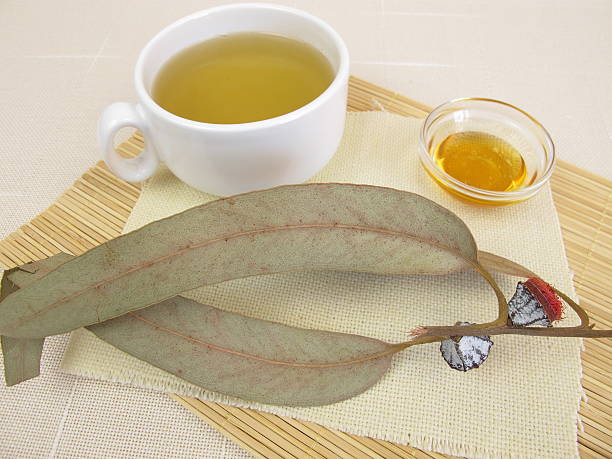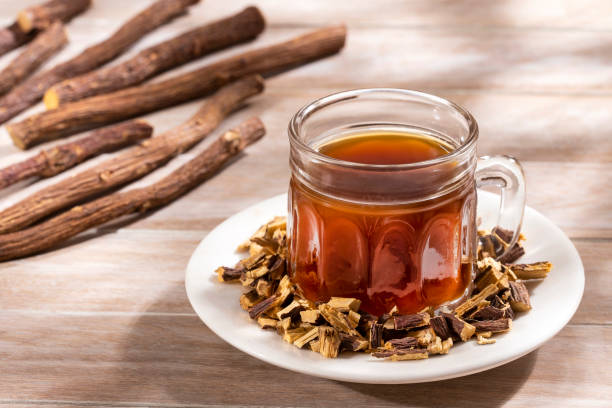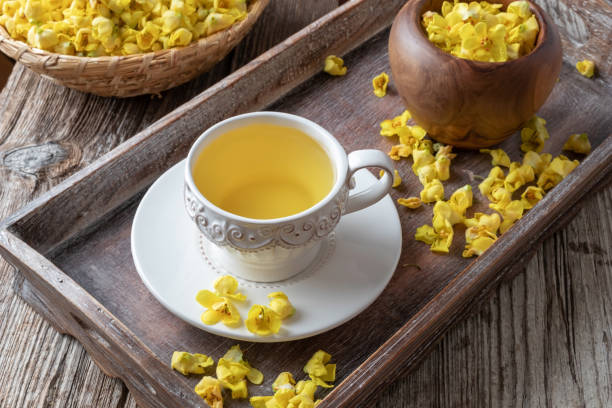
Asthma is a chronic illness that affects the lining of your airways, which become inflamed and narrow, resulting in symptoms like shortness of breath, wheezing, coughing, and chest tightness.
RELATED: 7 Teas That Detox Your Lungs
Although there are multiple traditional treatments for asthma, some herbal teas may relieve symptoms.
Here are 7 teas for lungs that may provide asthma relief.
Ginger tea

Ginger tea is made by boiling the roots of the ginger plant.
This potent spice is packed with nutrients and bioactive compounds. It’s associated with benefits like reduced inflammation, nausea relief, and lower blood sugar levels.
Research indicates that ginger may help relieve asthma symptoms.
Ginger compounds, such as gingerols and shogaols, may relieve asthma symptoms by lowering airway inflammation.
RELATED: 8 Benefits Of Drinking Ginger Tea
Green tea

Green tea is a popular drink that emanated from the leaves of the Camellia sinensis plant.
It’s loaded with nutrients, plant compounds, and antioxidants, which are tied to weight loss, as well as a lower chance of type 2 diabetes, heart disease, and specific cancers.
In addition, research indicates that green tea may alleviate asthma symptoms.
RELATED: The Fat-Burning Power Of Green Tea
Green tea is a source of caffeine, which may help soothe your airways for up to 4 hours and provide interim alleviation from asthma symptoms.
Black tea

Like green tea, black tea comes from the Camellia sinensis plant. However, it’s exposed to air for oxidation, which causes the leaves to turn dark brown, strengthening the flavor. It’s frequently blended with other elements to make teas like English breakfast or Earl Grey.
Similar to green tea, black tea includes caffeine, which may help soothe your airways and modestly enhance lung function.
Its other potential advantages include a lower risk of heart disease and type 2 diabetes.
Eucalyptus tea

Eucalyptus tea is assembled from the leaves of the eucalyptus tree, which is filled with potent antioxidants and plant compounds like eucalyptol.
Notably, eucalyptol may help treat asthma symptoms.
Licorice tea

Licorice tea is made from the root of the licorice plant (Glycyrrhiza glabra) and has a distinctly sweet but slightly bitter flavor.
In conventional medicine, licorice root has long been used to treat miscellaneous illnesses, including asthma.
Animal studies report that the licorice compound glycyrrhizin extract relieves asthma symptoms, particularly when combined with conventional asthma treatments like salbutamol (albuterol).
Mullein tea

Mullein tea is a creamy and fragrant infusion made from the common mullein (Verbasscum thapus), which is native to Europe, Asia, and Africa.
It has been used in conventional medicine for thousands of years to remedy respiratory conditions, such as bronchitis, mucus buildup (catarrh), and asthma.
Animal and human analyses indicate that mullein may help treat asthma symptoms like coughing, gasping, and shortness of breath by decreasing inflammation, which helps loosen the muscles in your respiratory tract. Still, more research is needed.
Mullein tea is available in prepackaged tea bags and or dried leaf form.
RELATED: Teas That Improve Your Skin
Breathe Easy tea
Breathe Easy tea is a distinctive herbal formulation meant to enhance respiratory health. It’s manufactured by the company Traditional Medicinals.
It possesses various Western and traditional Chinese herbs, including:
- fennel fruit
- licorice root
- eucalyptus leaves
- Bi Yan Pian (a blend of 11 Chinese herbs)
- a proprietary blend of peppermint leaf and ginger rhizome
Although no studies have investigated this particular tea, it compacts a variety of ingredients that may soothe asthma symptoms.
RELATED: Struggling With Your Asthma Treatments? Try These Instead
Summary
Specific herbal teas may help reduce asthma symptoms.
Research indicates that ginger tea, green tea, black tea, eucalyptus tea, fennel tea, and licorice tea may decrease inflammation, soothe your respiratory muscles, and strengthen your breathing, among other benefits.
Remember that these teas should be used in tandem with your current asthma drugs and shouldn’t be seen as a substitute.









